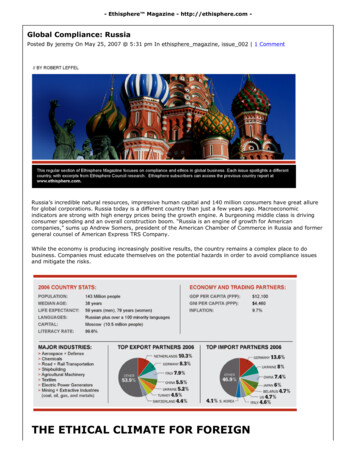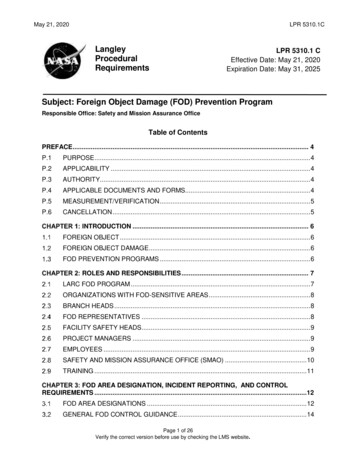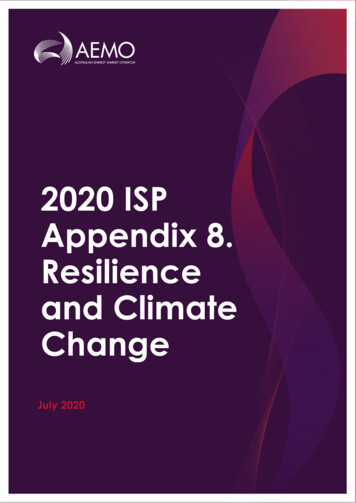
Transcription
- Ethisphere Magazine - http://ethisphere.com -Global Compliance: RussiaPosted By jeremy On May 25, 2007 @ 5:31 pm In ethisphere magazine, issue 002 1 CommentRussia’s incredible natural resources, impressive human capital and 140 million consumers have great allurefor global corporations. Russia today is a different country than just a few years ago. Macroeconomicindicators are strong with high energy prices being the growth engine. A burgeoning middle class is drivingconsumer spending and an overall construction boom. “Russia is an engine of growth for Americancompanies,” sums up Andrew Somers, president of the American Chamber of Commerce in Russia and formergeneral counsel of American Express TRS Company.While the economy is producing increasingly positive results, the country remains a complex place to dobusiness. Companies must educate themselves on the potential hazards in order to avoid compliance issuesand mitigate the risks.THE ETHICAL CLIMATE FOR FOREIGN
ENTERPRISESGovernment bureaucracy, poorly established rule of law,rampant corruption and criminality affect virtually allaspects of Russia’s business environment. Althoughconditions are slowly improving, it remains anunderdeveloped business culture and poor ethical climate.Russia is well known for its red tape, corruption, linksbetween business and mafia, extortion, and kidnapping ormurder as means of eliminating competitors.Business ethics is a low priority given the abundance ofother problems, uncertainties and risks that companies facein Russia. Some don’t have enough time to focus onbusiness ethics and compliance. Others view ethics andcompliance as irrelevant. Therefore, companies are forcedto divert substantial resources to protect against criminalextortion and unfair competition, “feed” the statebureaucracy, and closely monitor business partners andemployees.Some Russian business leaders say they are tired ofplaying a “game without rules” and would welcome a morecivilized business environment. A recent PWC survey of Russian CEOs found that 86% view corruption,bureaucracy and administrative barriers to be the main hindrances to business development. Thus, theconcept of business ethics is beginning to grow in awareness and practice.Western corporations have helped increase awareness, and it is possible to operate in Russia with efficientmanagement and responsible corporate governance. According to the American Chamber of Commerce inRussia, “U.S. companies are making a profound and lasting impact on their Russian employees and businesspartners, consistently and strongly communicating such key values as law compliance, merit-basedcompensation, strong business ethics and corporate social responsibility.”When rolling out a global Code of Ethical Conduct to Russian employees, a U.S. company should include apreamble or some form of introductory communication, where a brief summary of the Russian “reality” shouldbe given so that readers do not view the Code writers to be Utopians. This should be followed by anexplanation of why implementing the Code is relevant and necessary for the Russian company in question. Putthe ‘international’ business ethics standards and principles into the local context. Draw on the positiveexamples in Russian business history.ALLOW PLENTY OF TIME FOR APPOINTMENTSAlways be punctual, but do not be surprised if your Russian contacts are not. Generally, the more importantthe meeting is for your counterparts, the more punctual they will be. Allow plenty of time for eachappointment and never schedule them back to back.PLAY HARDBALLRussians view quick compromise in negotiations as a sign of weakness. They will refuse to back down untilyou agree to make suffi cient concessions or show exceptional firmness. They will often make minorconcessions and ask for major ones in return. Delay tactics, emotional outbursts, threats to end the deal,walkouts, and other pressures are typical. You must remain calm and emphasize mutual benefits and needs.BRING PLENTY OF GIFTS
Russians take pleasure in giving and receiving gifts. Be sure to bring an assortment of gifts (in line with yourcompany policy of course). Tasteful souvenirs from home, fine chocolates, wine, or even some memorabiliayour Russian contact can display in the office are generally good, safe choices.LEARN PATRONYMICSRussians have three names: first, patronymic (father’s name) and surname. Addressing a person whom youhave just met by his or her first name is not polite. As a foreigner, using first name with the patronymic (e.g.Ivan Petrovich) will show your Russian contact your awareness of local culture.INVEST IN PENS, TIES AND SUITSRussian business people are extremely well dressed. Investing ingood, expensive-looking designer suits, shoes, ties and pens will give the impression that you are a “serious”person. Make sure to bring several, so you can change every day- Russians will notice if you do not.MIX BUSINESS WITH PLEASURERussians mix business with pleasure. Business conversations can turn to personal issues or become a socialevent. Your enthusiastic participation is expected. Your Russian companions may be more interested in thepersonal side of your character than the business agenda. Allowing your contact to get to know you personallyis an essential part of successfully conducting business in Russia.PRACTICE YOUR DRINKING SKILLSRussia is a drinking culture. Having a drink with your Russian counterparts is one of the easiest ways toestablish good will. Refusing to drink is unacceptable and suspicious unless you give a plausible excuse, suchas a health or religious reason.HANDSHAKES AND EYE CONTACTThe Russian version is a firm grip with several quick shakes between two men. This is a daily ritual and saying“hello” is not enough, even if you know someone well. With women, the handshake is much softer, and menshould wait until a woman extends her hand. Between women, the older woman extends her hand first.Maintain eye contact as long as the individual is addressing you.WOMEN SHOULDN’T PAY FOR DINNERThe business dinner is generally a time for sealing a deal and if you are invited out, expect lavish entertainingin a restaurant. The person extending the invitation pays the bill (but the guest should offer all the same).Insisting to pay is a waste of time, but you can try to pay your share of the bill citing the company policy. Ifyou are a woman, your male guests will be insulted if you even attempt this.BRING FLOWERS WHEN VISITING A RUSSIAN HOMEIf invited to someone’s home, bring a flower bouquet if any female relatives of your host are likely to bepresent (odd number of flowers only, as even numbers are for funerals). Likely remove your shoes uponentering as you will be given a pair of slippers to wear.01 // CORRUPTION, BRIBERY AND KICKBACKSThere is a good reason why the Transparency International Corruption Perception Index ranks Russia #121along with Rwanda and Honduras. There is a high level of administrative pressure and bureaucracy, andthereby corruption affects such vital areas as establishing a business, obtaining permits and licenses, taxcollection, property rights, dispute resolution, product certification and standards, as well as customsclearances, imports and exports. Commercial bribery and kickbacks are common.DEAL WITH ITDon’t be naà ve. Although the government says it’s taking corruption seriously (it even published a bookleton how to recognize and report bribe-takers), expect your managers and employees to be pressured to givebribes as well as be tempted to receive bribes. The only effective solution is zero tolerance, strict policies,detection procedures and ongoing communication. Be aware that bribes and kickbacks can take the form ofexpensive gifts and gift cards, vacations and even “charitable” donations. An unwavering commitment to antibribery policies will be respected and successful.
02 // CONFLICTS OF INTERESTThe concept of conflicts of interest is fairly new in Russia and not very well understood or enforced. Lavishgifts and entertainment, hiring and supervising family members, steering business to family members, takingadvantage of employer’s property and information for personal benefit and moonlighting are all common.DEAL WITH ITFocus on the issue, and it may melt under scrutiny. Emphasize objective decision-making and how a conflictof interest may undermine objectivity. Have policies, procedures and training in place. Employees andmanagers should disclose any conflicts of interest to a supervisor or the legal department. A single standard isa must as few things are more demoralizing than exceptions and special treatment for senior managers.03 // INTELLECTUAL PROPERTYRespect for private property including intellectual property is still in its infancy. Software, music and moviepiracy is generally condoned if not practiced en masse. This includes patent infringement, plagiarism, misuseof property or technology provided under a franchising license and outright theft of intellectual property.Typical excuses range from “I can’t afford it” and “the copyright owners are rich enough” to “knowledgebelongs to all people” and “it’s good for the country.”DEAL WITH ITThe root of the problem seems to be part cultural and part economics. Clear policies and enforcement will helpensure that your employees keep the law. However, when it comes to protecting your own IP, you should becautious about what you transfer to the region. You cannot rely on legal protections and injunctions.Furthermore, there is a high risk that a terminated employee will take IP. While security controls areimportant, the best counter-measure is consistent and preventative education for employees.04 // SEXUAL HARASSMENT AND DISCRIMINATIONRussia is a multi-ethnic, multi-religious and multi-cultural society that is far from harmonious. Although civilrights are enshrined in the Russian constitution, and discrimination is generally illegal, proper enforcementremains problematic. Coupled with prejudice towards certain ethnic and racial groups and the lack of womenin senior management, these factors can create serious challenges to any organization that is committed todiversity.DEAL WITH ITWhile the legal liability for discrimination and harassment is not significant, most Western companies haveextended their anti-harassment and anti-discrimination policies successfully in Russia. It helps if Russians areplaced in a proportionate amount of managerial and executive positions. Populating leadership with onlyWesterners is less effective. When Russian managers are informed about inclusion, Western practices, andcompany expectations, they can demonstrate inclusion through leadership. Communication and quick actionwhen problems arise is also effective.05 // TRANSPARENCY AND DISCLOSUREOne key characteristic of business in Russia is excessive secrecy or the imperative of nondisclosure ofinformation to third parties, including to the government. Given the high level of administrative pressure onbusinesses in Russia and the corruption opportunities that this generates (illegitimate demands forinformation by government bodies or armed raids by the tax police), such situations can and do arise.DEAL WITH ITIt is important to draw a clear line between disclosure of information and guarding the confi dentiality ofrestricted access information. For the benefi t of guiding managers and employees, make sure to clearly labelthe information and to whom it can be disclosed. Also iterate that departure from such guidelines must bepreviously approved by legal.06 // REPORTING MISCONDUCTReporting misconduct, especially anonymously, carries a social stigma in Russia. As Solzhenitsyn once said inreference to history, half of the Russians were telling on the other half. At the time of the oppressive policestate, informing was often used as means to settle scores or to get rid of the competition. Alleged “violators”
could fi nd themselves in Siberia for next 15 years or worse. Today, with the gang sub-culture being in fashionamong some, especially the young and less privileged, an absolute taboo on reporting to “authorities” is apillar of the criminal “code of honor.”DEAL WITH ITStart with putting the reporting requirement in the Russian context. Speak about it to the employees in theway they would understand and don’t just copy the standard language from the corporate Code. Explain whythe reporting mechanism is an important tool to ensure the culture of ethics and compliance. Emphasize nonretaliation. Make it clear that neither misconduct nor purposely false reporting will be tolerated. And fi nally,be realistic: don’t rely on it too heavily as your source of compliance.Article printed from Ethisphere Magazine: http://ethisphere.comURL to article: yright 2007 Ethisphere. All rights reserved.
Ac cording to the American Chamber of Commerce in Russia, "U.S. companies are making a profound and lasting impact on their Russian employees and business partners, consistently and strongly communicating such key values as law compliance, merit-based compensation, strong business ethics and corporate social responsibility."











